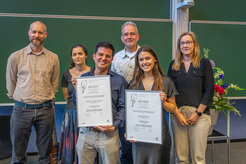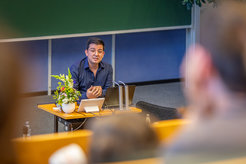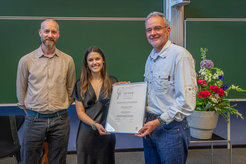Jeff Schell Prizes awarded to exceptional young scientists in molecular evolution and seed development
Max Planck Institute honours Dr. Enrique Gonzalez-Duran and Dr. Rita Bastos Lima for their outstanding achievements
The Jeff Schell Prize is awarded annually in a festive ceremony by the Max Planck Institute of Molecular Plant Physiology in Potsdam-Golm. This year, the institute is awarding two young scientists, Dr. Enrique Gonzalez-Duran and Dr. Rita Bastos Lima, for their breakthrough research in the fields of molecular evolution and seed development. The award, sponsored by Targenomix, honours early career scientists who contributed to major advances in plant science.

The research conducted by Dr. Enrique Gonzalez-Duran expands our knowledge about how plant genomes remain stable during evolution
Mutations are the driving force behind evolution. One source of mutation is endosymbiotic gene transfer (EGT), a process in which DNA from organelles such as chloroplasts integrates into the nuclear genome — using sites of DNA damage known as double-strand breaks (DSBs) as entry points. Although EGT can sometimes be destabilizing for the genome, it has played a key role in the evolution of eukaryotic cells. The molecular mechanisms controlling this process, however, remained completely unknown.
Dr. Gonzalez-Duran was able to demonstrate that the DSB repair pathways act as strong suppressors of EGT in plants. This led him to propose a new model for how EGT frequencies are controlled to keep the genomes stable. This model has profound implications for our understanding of eukaryotic genome evolution and is highly relevant to plant biotechnology and genetic engineering. Given the conservation of DNA repair pathways across plants, animals, and fungi, his research may have implications that extend well beyond plant biology.

About Dr. Enrique Gonzalez-Duran
Dr. Enrique Gonzalez-Duran is currently working as a postdoc in the research group Organelle Biology and Biotechnology at the Max Planck Institute of Molecular Plant Physiology, where he also completed his doctorate. Before that, Enrique Gonzalez-Duran studied Biochemistry at the Pontificia Universidad Católica de Chile (PUC), where he did research as a student in the lab of Xavier Jordana at the Facultad de Ciencias Biológicas (FCB).
The findings of Dr. Rita Bastos Lima about the role of Brassinosteroids on seed development might increase yields in the future
Seed development is a tightly coordinated process that determines both the reproductive success and yield of flowering plants. This process is especially important for global food security, as seeds—such as rice, wheat, and corn—make up a substantial portion of the human diet.
Within each seed, three key structures must develop in concert: the embryo, the endosperm, and the seed coat. While it had long been suspected that signals from the maternal seed coat regulate endosperm proliferation, the exact nature of these signals remained unknown.
During her time at the Max Planck Institute in Potsdam, Dr. Bastos Lima uncovered a crucial piece of this puzzle. She demonstrated that brassinosteroids (BRs)—plant hormones synthesized and perceived in the seed coat—are essential for coordinating seed coat expansion with endosperm growth. By selectively manipulating BR activity in the maternal seed coat, she was able to regulate endosperm proliferation.
Crucially, she found that BRs shape the physical properties of the seed coat, and that these physical properties —in particular its stiffness— control endosperm proliferation. This highlights the underestimated role of physical signals in the communication between the two seed structures.
Dr. Bastos Limas work provides important answers to fundamental questions in plant developmental biology and opens up exciting new avenues for research. It also holds significant biotechnological potential, as the regulation of endosperm proliferation is a critical factor in determining seed size and crop yield.

About Dr. Rita Bastos Lima
Rita Bastos Lima studied Biology at the Uppsala University of Sweden and at the University of Porto, Portugal. She obtained her PhD in 2023 at the lab of Dr. Duarte Figueiredo at the Max Planck Institute of Molecular Plant Physiology. Since late 2024, Dr. Rita Bastos Lima has been conducting research on plant reproduction in the group of Prof. Charles Underwood at the University of Nijmegen, Netherlands.
Jeff Schell revolutionized plant research
Jozef Stefaan (Jeff) Schell (1935–2003) was a Belgian molecular biologist who transformed the field of plant biotechnology. He studied zoology and microbiology at the University of Ghent, where he later worked as a professor from 1967 to 1995. From 1978 to 2000, he led the Department of Molecular Basis of Plant Breeding at the Max Planck Institute for Plant Breeding Research in Cologne.
Schell was one of the pioneers of biotechnology. As a microbiologist, he focused on the interactions between plants and soil bacteria. His ground-breaking work on plant tumours led to the discovery that the soil bacterium Agrobacterium tumefaciens is capable of transferring genes into plant genomes. This insight laid the foundation for a technique that revolutionized plant research by enabling the targeted introduction of genes into plants. This method for transforming plants is still used today, as it allows scientists to analyse gene functions in detail, deepening our understanding of plant metabolism, growth, and development. Schell’s contributions remain fundamental to modern plant biology and agricultural biotechnology.


